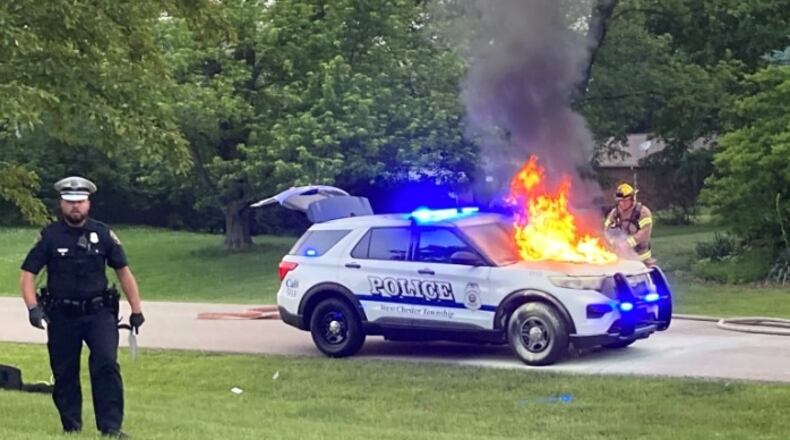“Defendants design, manufacture and distribution of the Explorer, which suffered from the defect was negligent, grossly negligent, reckless, willful, wanton and intentional,” the lawsuit reads.
According to the lawsuit the township bought the vehicle in January 2021 and it was deployed for the first time on May 31, 2021 for a 12-hour shift. At shift change, Officer Gabe Staton began patrolling and was dispatched to an emergency on Lake Meadow Court. He drove about 65 miles per hour for around three miles to reach the incident.
He left the vehicle running because his lights were activated and two minutes later someone yelled the Explorer was on fire. Staton tried using his onboard fire extinguisher to no avail and “flames were visible under the Explorer and through the Explorer’s hood area.”
The fire department was called and extinguished the fire “at the time the Explorer was destroyed by the engine fire, it had an approximate odometer reading of 150 miles.”
The suit says OTARMA paid the township for the damaged vehicle but West Chester had to pay the $500 deductible — they want to be made whole and then some. The five-count action asks the court to award “actual, compensatory, exemplary, punitive and other damages” to OTARMA to stop Ford from manufacturing other “defective” vehicles.
The suit notes “defendants have not taken any steps to attempt to resolve the defect or the claims alleged herein” since they were notified about the engine explosion in August 2021.
It claims West Chester has been “deprived of the use of the Explorer, has had to spend time and resources replacing the Explorer and has had to spend time and resources securing alternative transportation” and “these qualify as direct, incidental or consequential pecuniary (monetary) loss.”
The lawsuit cites numerous examples from the National Highway Traffic Safety Administration where engines in Ford vehicles have spontaneously caught fire.
“Spontaneous engine fires create significant risks of bodily injury and/or death to those inside vehicles, like the Explorer, which experience them, as well as significant risks to structures and other real and personal property...,” the lawsuit reads and later adds, “West Chester Township relied upon defendants to furnish a vehicle that could actually be driven without exploding.”
Hamilton police haven’t experienced any sudden engine explosions with their Ford SUVs, but Capt. Trent Chenowith said Ford recalls are problematic.
“Recalls from Ford are taken very seriously and dealt with promptly to avoid unnecessary mechanical issues with our fleet of cruisers,” he told the Journal-News. “The recalls are inconvenient and have increased in frequency over the last few years, but that is often a byproduct associated with a body style change or engine conversion.”
The Journal-News looked up the Vehicle Identification Number — provided in the lawsuit — on the NHTSA website and it was recalled last year for a rear axle mounting bolt that “may fracture during vehicle acceleration.” The recall notes if the repairs were not made it “increases the risk of crash or injury.”
The last major Ford fire risk recall was issued in November 2022 for 2020-2023 Bronco Sport and Escape SUVs with possible cracked fuel injectors. Another was issued last May for 2021 Ford Expeditions and Lincoln Navigators when owners were instructed to park their vehicles outside due to the risk of fire, according to the NHTSA.
“Fires have occurred in vehicles that were parked and turned off,” the recall notification reads in part. “More than 39,000 vehicles are affected, and at this time there is no known cause or remedy.”
Ford did not respond to a request for comment. Robert Reichert, the attorney for Lebanon Ford, said “we really have nothing to say about pending litigation, it’s the matter of the insurance company versus Ford Motor Company essentially.”
About the Author

